September 2012
Season Opener
Outmanoeuvred
Failure to calculate
Giving Fritz Palpitations
Closure
Season Opener
RR formed part of a contingent of six Newcastle players who descended upon (climbed up to?) Leek to take part in the congress there. I hope to persuade some of the others to reproduce some of there games here later, but for the time being my readers will be stuck with my five games.
Being one of the lower seeds in my section I was not surprised to be outgraded in round one, a circumstance I would suffer throughout the congress. At least I had white, against Robert Taylor (Preston, not Fenton). This would be my first longplay game since April, so it would be interesting to see whether various club quickplays and friendlies have kept the rust from my game.
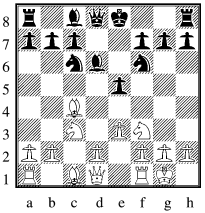
|
| RR v Robert Taylor after 6 ... Nf6
|
r1bqk2r/ppp2ppp/2nb1n2/4p3/2B5/2N1PN2/PP1P1PPP/R1BQ1RK1 w
Neither of us tried anything too ambitious in the first few moves, so rapidly reached the position shown left. RR's immediate concern is to make sure he doesn't end up with a backward pawn on the half open d-file. After a brief consideration of both Qc2 and d3, RR plumped for the more expansive d4:
7 d4 O-O Black can play the cramping e4 without loss of material:
7 ... e4, 8 Ng5 appearing to win material by forking e and f pawns
8 ... 0-0, 9 Ngxe4 (f3 better) Nxe4, 10 Nxe4 Bxh2+, 11 Kxh2 Qh4+, 12 Kg1 Qxe4 evening things up on the material front, though white's central pawns should give him an edge.
8 d5 Ne7, 9 e4 a6, 10 a3 Ne8, 11 b4 f6, 12 Be3 g6
13 Qb3 Kg7, 14 Nd2 g5 Unexpected. Had anticipated f5 with intent to launch a fullscale frontal attack on my king, though in truth I felt comfortable about this too as our slow build-up has left his pieces tripping over each other.
15 b5 b6, 16 bxa6 Bxa6, 17 a4 Kh8,
18 Rfc1 Ng7, 19 Bb5 Nh5, 20 g3 Nf4
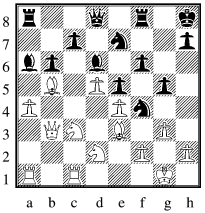
|
| RR v Robert Taylor after 20 ... Nf4
|
r2q1r1k/2p1n2p/bp1b1p2/1B1Pp1p1/P3Pn2/1QN1B1P1/3N1P1P/R1R3K1 w
Now what? I still don't see his attack going anywhere. Perhaps take off the white squared bishops, and then Qc4 to keep his knight out of e2 and d3. Instead RR chose the inferior:
21 Nc4 Nd3, 22 Rc2 Nc5, 23 Qb1 Bxb5, 24 Qxb5 Nb7
Another unexpected play - thought I'd be confronted by the knight on c5 for a long time.
25 a5 Nxa5, 26 Nxa5 bxa5, 27 Rxa5 Rb8, 28 Qc4 Rb4
29 Qa6 Qd7, 30 Bc5 Bxc5, 31 Rxc5 Rfb8 The continuous queenside pressure that has left black's c-pawn as a target has also worn him down mentally, and this blunder should effectively end the game provide white is careful.
32 Qxf6+ Kg8, 33 Qxg5+ Ng6, 34 Kg2 Cautious. Can go for the jugular with h4
34 ... Rb2, 35 Nd1 missing the coming tactic. Exchanging rooks needed first.
35 ... Rxc2, 36 Rxc2 Qa4 ouch, 37 Ne3 Qxe4+
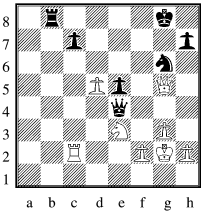
|
| RR v Robert Taylor after 37 ... Qxe4+
|
1r4k1/2p4p/6n1/3Pp1Q1/4q3/4N1P1/2R2PKP/8 w
Now f3 seems to leave my queen protecting my knight which is protecting my rook whicch is defending my second rank. Not a lot of mobility left, so I'll risk the dreaded Kh3 even though my king may start to feel claustrophobic.
38 Kh3 Rf8 this is getting hairy
39 Rc4 Why? - more of a help to him than me. Qh1, 40 Rxc7 Rxf2
41 Rc8+ Rf8 Relief. Thought we might be getting draw by repetition:
41 ... Kf7, 42 Rc8+ Ke8 and I can't see anything better to do than carry on checking as I can't allow black to get in Rxh2+ and Qe4+.
41 Qd8+ was needed. If black interposes the rook he won't enjoy Qd7, whilst a knight retreat allows my knight to hold my position together by moving to g4.
42 Rxf8+ Kxf8, 43 Qf6+ Kg8, 44 Ng4 sets up a mate in one
44 ... Qc1, 45 d6 Qd2, 46 Qe6+ Kg7, 47 Qd7+ Kf8
48 Qf5+ Kg8, 49 d7 Qd1, 50 Qe6+ Kf8 51 Qf6+ Kg8 and forgets it
52 d8=Q+ 1-0
comment on this article
Outmanoeuvred
1 e4 d5 2 Nc3 d4 3 Nce2 c5 4 Ng3 e5 5 Nf3 Bd6 6
Bc4 Nf6 7 d3 h6 8 Nh4 Bg4 9 f3 Bd7 10 Nhf5 Bf8 11 Nf1 g6 12 N5g3 Bg7 13
h3 Qc7 14 a4 Nc6 15 Nh2 Na5 16 Ba2 c4 17 O-O Be6 18 f4 cxd3 19 cxd3 Qb6
20 Bxe6 fxe6 21 b4 Nc6 22 b5 Ne7 23 Nf3 Nd7 24 fxe5 O-O 25 Ba3 Rf7 26
Qb3 a5 27 Bd6 Nc8 28 Qxe6 Nxd6 29 Qxd6 Qxd6 30 exd6 Rc8 31 Rac1 Rc3 32
Rxc3 dxc3 33 d4 Rxf3 34 gxf3 Bxd4+ 35 Kg2 Nb6 36 Ne2 Bf6 37 Rc1 Nxa4 38
f4 Kf7 39 e5 Bd8 40 Nxc3 Nb6 41 Ne4 Nd5 42 Kf3 b6 43 Rc8 Ke8 44 e6 1-0
comment on this article
Failure to calculate
1 e4 d5 2 Nc3 d4 3 Nce2 c5 4 d3 Bg4 5 g3 e5 6
Bg2 Nc6 7 h3 Be6 8 Nf3 f6 9 Nh4 Qd7 10 f4 Bd6 11 f5 Bf7 12 g4 c4 13 a3
h6 14 Ng3 Nge7 15 Nh5 Rh7 16 O-O O-O-O 17 b4 Kb8 18 Bd2 c3 19 Be1 Rg8 20
Bf2 Nd8 21 Qe2 Be8 22 Rfb1 Rf8 23 b5 g6 24 fxg6 Nxg6 25 Nf5 Ne6 26 Bg3
Ngf4 27 Nxf4 exf4 28 Nxd6 fxg3 29 Nxe8 Qxe8 30 Qf3 Ng5 31 Qxg3+ Qe5 32
Qxe5+ fxe5 33 Rf1 Rhf7 34 Rf5 Rxf5 35 exf5 Rf6 36 Re1 Kc7 37 Rxe5 Kd6 38
Rd5+ 1-0
comment on this article
Giving Fritz Palpitations
Sunday morning, and back to white, and my first game against Ben Scatteergood. His Wunderkid tendencies - putting on 38 grading points in a year - marks him as one to be beaten (if possible) while one still has the chance. One of the biggest battles in chess, particularly between players of a similar standard, is trying to reach positions in which you feel comfortable, and the opponent doesn't. Sometimes you don't seem able to prevent a game developing along lines not of your choosing, yet sometimes one can't resist the dangerous temptation to deviate from ones normal territory. After a day and a half of nudge-nudge wink-wink chess RR couldn't resist the temptation to indulge in some thud and blunder, despite knowing his opponent is reputed to be comfortable with tactical maelstroms. Putting the game on Fritz afterwards certainly checked that the bulbs in his red and yellow lights hadn't failed.
We join the game with Ben considering his ninth move.
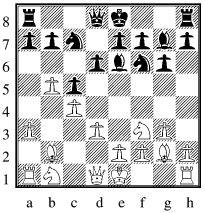
|
| RR v Ben Scattergood after 9 Bg2
|
r2qk2r/ppn1ppbp/3pbnp1/1Pp5/2P5/P2P1NP1/1B2PPBP/RN1QK2R b
9 ... d5, 10 Nbd2 Qc8, 11 Qa4 Being in a crude rather than Sunday best mood, RR encourages Ben to castle as too quick an attempt to exchange white squared bishops
11 ... Bh3, 12 Bxh3 Qxh3, 13 b6+ costs a piece.
11 ... O-O
Normal service is to castle and grind on. Today however:
12 h4 dxc4, 13 dxc4 Nce8, 14 Ng5 Bd7, 15 Qc2 Nd6 Perhaps he is still expecting me to castle short so wants to keep bishop and queen lined up against h3, but it seems better to play Qc7 freeing access to d8 for his a-rook whilst seeing whether I really have an attack.
16 h5 Nxh5, 17 Bxg7
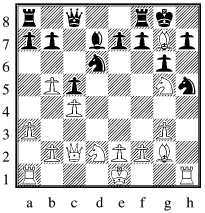
|
| RR v Ben Scattergood after 17 Bxg7
|
r1q2rk1/pp1bppBp/3n2p1/1Pp3Nn/2P5/P5P1/2QNPPB1/R3K2R b
17 ... Kxg7, 18 Rxh5 h6 (check for yourself why gxh5 is not a good idea)
19 O-O-O Bf5 Alan told me afterwards that he had seen this position when looking around between moves in his own game, noticing that I had three pieces en prise. Luckily it was my move!
20 Qc3+ f6, 21 Rxh6 Kxh6, 22 Rh1+ Kg7, 23 Rh7+ Kg8
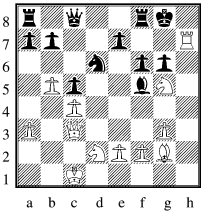
|
| RR v Ben Scattergood after 23 ... Kg8
|
r1q2rk1/pp2p2R/3n1pp1/1Pp2bN1/2P5/P1Q3P1/3NPPB1/2K5 w
Now what? The pinned f-pawn stays so if I grab the e-pawn, which I probably should. Instead RR selects the inferior e4. Hitting pieces is nice, but doesn't he prefer his bishop on g4 anyway? As you can tell I'm running out of ideas, and beginning to think that perhaps I'll need to get in Bxb7 at some point so that my queenside pawns can win an endgame. Fortunately Ben is still playing without his a-rook.
24 e4 Bd7, 25 Rxe7 Ne8, 26 Nh7 Rf7, 27 Rxf7 Kxf7
28 e5 Kg7, 29 Ng5 (Nxf6 more powerful)
29 ... fxg5, 30 e6+ Nf6, 31 Ne4 Qf8, 32 exd7 Rd8
33 Nxg5 Qe7, 34 Bxb7 Rxd7, 35 Bd5 Kh6 The king moves, but the knight is still pinned.
36 f4 Qg7, 37 g4 Qf8, 38 Ne6 Qh8, 39 g5+ Kh7, 40 Qxf6 Qxf6 Black can't stop the queens coming off, so that despite white's shortage of time, mopping up operations are straightforward - not that RR doesn't miss a mate in one at the end.
41 gxf6 Kh6, 42 Kd2 Rf7, 43 Ke3 Rxf6, 44 a4 Kh5, 45 a5 Rf7
46 b6 Kg4, 47 b7 Rh7, 48 Bf3+ Kg3, 49 b8=Q a6, 50 f5+ Kh4
51 Qf4+ 1-0
So RR got there in the end, but the violence must more Saturday night drunk than SAS.
comment on this article
Closure
1 Nf3 Nf6 2 c4 c5 3 g3 b6 4 Bg2 Bb7 5 O-O e6 6
Nc3 Be7 7 Re1 O-O 8 e4 d6 9 d4 Nbd7 10 d5 e5 11 h3 a6 12 Nh2 Ne8 13 g4
Bg5 14 Qd3 Bxc1 15 Raxc1 Qe7 16 a4 a5 17 Nf1 Nc7 18 Ng3 g6 19 Qe3 f6 20
Bf3 Na6 21 Kg2 Nb4 22 Rh1 Ba6 23 Be2 Rad8 24 h4 Nb8 25 h5 g5 26 Nf5 Qd7
27 h6 Qf7 28 Rh5 Kh8 29 Nb5 Bxb5 30 cxb5 1/2-1/2
comment on this article






